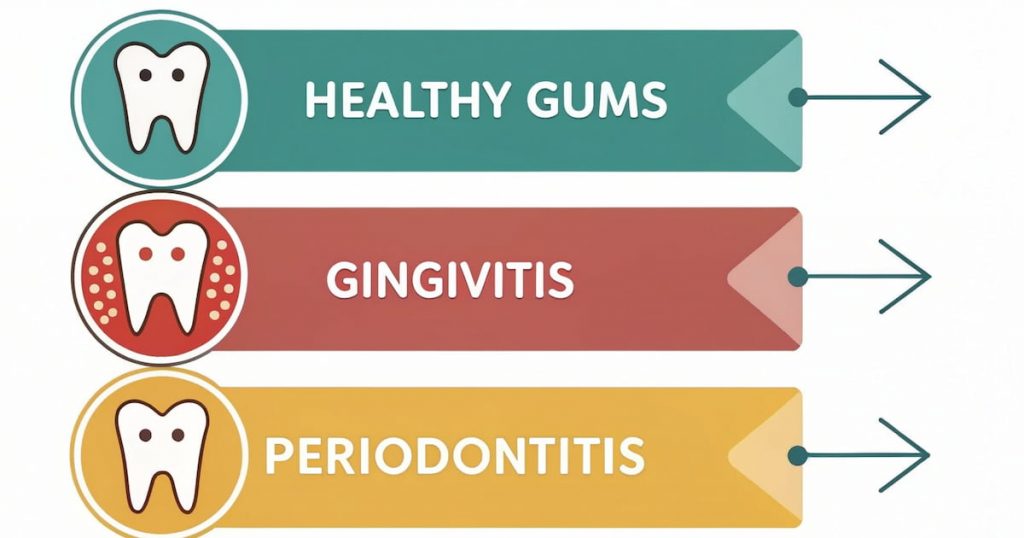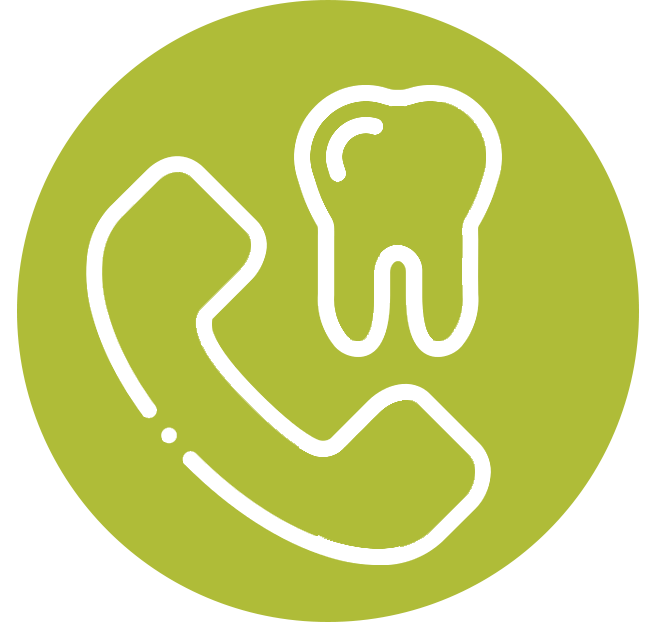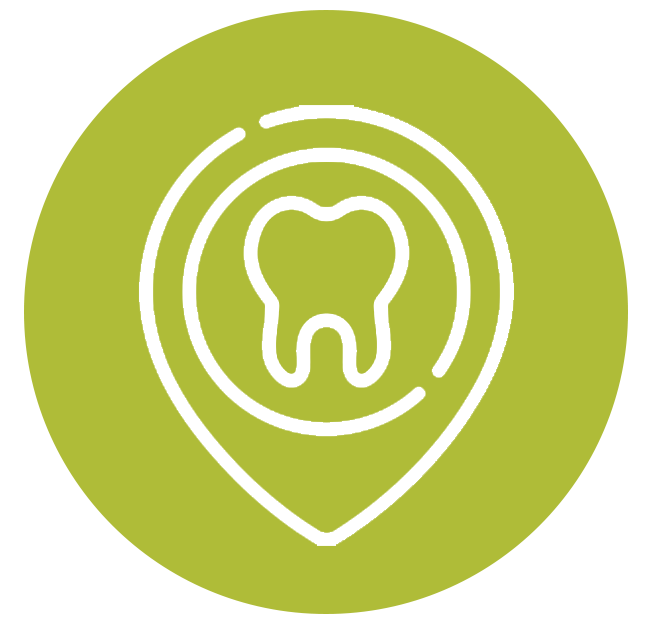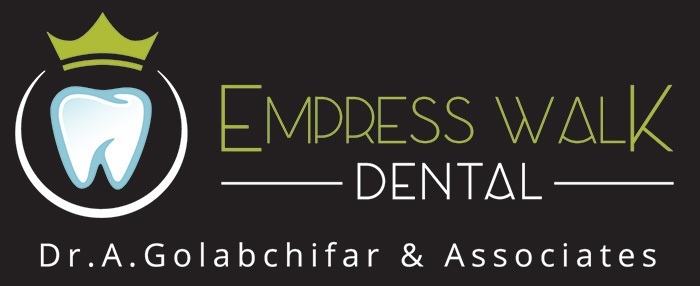You’re brushing your teeth like any other day, and suddenly you notice blood on your toothbrush or in the sink. There’s no pain, and you haven’t injured your gums, so what’s going on?
Gums bleeding without an obvious cause can be an early sign of gum disease (gingivitis), but they can also result from hormonal changes, vitamin deficiencies, certain medications, or hidden health issues.
The good news is that with proper daily care and professional support, gum bleeding is usually preventable. Routine dental exams and cleanings not only help catch problems early but also keep your gums strong and healthy. Let’s explore the main causes, symptoms, treatments, and prevention tips in detail so you can protect your smile for years to come.
Why Are My Gums Bleeding for No Reason?
Sometimes gums can bleed even when you haven’t injured them or felt any pain. This is often because of inflammation in the gum tissue, triggered by bacteria in plaque, a sticky film that builds up on teeth when oral hygiene is inconsistent. But gum inflammation is just one piece of the puzzle. Several other factors, from hormones to health conditions, can make gums bleed unexpectedly.
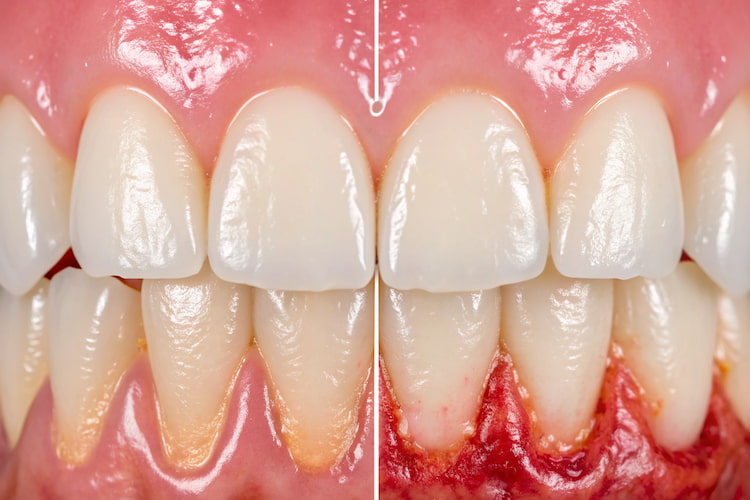
Gum Disease (Gingivitis and Periodontitis)
Gingivitis is the earliest stage of gum disease. It happens when plaque is left along the gumline for too long, causing redness, swelling, and easy bleeding, especially when brushing or flossing. At this stage, it’s still reversible with a proper dental exam and cleaning.
Thinking, “Why do my gums bleed for no reason?” This short and clear video is perfect for you. It breaks down the basics of gum disease in simple terms, helping you understand exactly why your gums might be bleeding and what that signals about your oral health.
Hormonal Changes
Hormones affect blood flow throughout the body, including your gums. During pregnancy, menstruation, puberty, or menopause, hormonal shifts can make your gums more sensitive to plaque, even if your oral hygiene hasn’t changed.
Nutritional Deficiencies
Your gums need certain vitamins to stay strong and healthy. Two of the most important are:
- Vitamin C: Essential for collagen production in gum tissue. A lack of it weakens the gums, making them more prone to bleeding.
- Vitamin K: Helps your blood clot properly. Without it, even minor gum irritation can cause prolonged bleeding.
Deficiency is more common in people with restrictive diets, poor absorption due to digestive issues, or certain medical conditions.
Medication Side Effects
Certain medications, like blood thinners, some heart medicines, and certain antidepressants, can increase gum sensitivity or make it harder for blood to clot. If your gum bleeding began after starting a new medication, it’s worth mentioning to both your dentist and your doctor.
If you’re experiencing sudden gum bleeding or discomfort and want expert care without delay, our Emergency Dental services at Empress Walk Dental are ready to help.
Systemic Health Conditions
Lastly, health conditions such as diabetes, blood clotting disorders, or immune system problems can affect your gum health. In some cases, bleeding gums are an early sign of an underlying medical issue that needs attention.
For more detailed information on why your gums might be bleeding, covering causes like plaque, vitamin deficiencies, and more, visit the MedlinePlus Medical Encyclopedia page on “Bleeding Gums”.
Symptoms That Often Accompany Gum Bleeding
| Symptom | Possible Reason |
|---|---|
| Red or swollen gums | Early gum disease |
| Bad breath or bad taste | Bacteria under the gumline |
| Gums pulling back from teeth | Gum disease or brushing too hard |
| Loose teeth | Advanced gum disease |
| Pain when chewing | Infection or inflammation |
How to Treat and Stop Bleeding Gums
The first step is improving your oral hygiene routine. Use a soft-bristled toothbrush and gentle, circular motions rather than scrubbing back and forth. Brushing twice a day and flossing once daily will help remove plaque and prevent it from irritating your gums.
For those wearing braces and experiencing bleeding gums, we have a detailed guide on how to brush your teeth with braces.

Antibacterial mouthwash can be a useful addition to your routine, helping to kill bacteria and reduce gum inflammation. If plaque has already hardened into tartar, it will need to be removed by a professional cleaning at your dentist’s office. This can make a big difference in reducing bleeding and giving your gums a chance to heal.
Your diet also plays a role. Eating foods rich in vitamin C, such as oranges, kiwis, and strawberries, and foods high in vitamin K, like spinach and kale, supports gum health and healing.
Book your gum health check today at Empress Walk Dental!
At Empress Walk Dental, our gentle, expert team can find the cause of your gum bleeding, provide targeted treatment, and guide you to healthier gums and a brighter smile.
Book your appointment today and let us guide you through every stage of your journey!
Preventing Gum Bleeding in the Future
Small, steady habits can make a big difference in keeping your gums healthy and strong:
1. Keep Up with Daily Care
Think of brushing and flossing as daily maintenance, not a chore. The goal is to prevent plaque from hardening and irritating your gums in the first place.
2. Schedule Regular Dental Checkups
Every 6 months is standard, but if you have gum problems, your dentist may recommend 3–4 month intervals.
3. Maintain a Balanced Diet
Your gums, like the rest of your body, need nutrients to stay strong. Include fresh produce, lean proteins, and whole grains daily.
4. Stay Hydrated
Water helps flush away bacteria and food particles, especially after meals. It also keeps saliva flowing, which naturally protects gums.

When to See a Dentist
If your gums bleed for more than a week despite good brushing and flossing habits, it’s time to see a dentist. You should also make an appointment if:
- Bleeding lasts more than a week despite better brushing/flossing.
- Gums are swollen, receding, or painful.
- You notice loose teeth or pus between teeth and gums.
- You take blood-thinning medication and notice sudden or heavy gum bleeding.
Seeing a dentist early can mean the difference between simple cleaning and complex gum surgery.
Sum Up
Bleeding gums may seem like a small issue, but they often signal a bigger problem brewing under the surface. By maintaining consistent oral care, eating nutrient-rich foods, and getting regular dental checkups, you can stop the bleeding and protect your smile for life.
You can easily schedule your appointment online with just a few clicks, book your visit here, and our welcoming team at Empress Walk Dental will reach out to find a time that works best for you.
FAQ
-
What causes my gums to bleed for no reason?
Gums may bleed without an obvious cause due to gum disease (gingivitis), hormonal changes, medication side effects, or poor oral hygiene.
-
Are bleeding gums always a sign of gum disease?
While bleeding gums are a common sign of gum disease, they can also be caused by improper brushing, vitamin deficiencies, or certain medications.
-
Can stress cause my gums to bleed?
Yes, stress can lead to hormonal changes that make gums more sensitive, especially in women.
-
How can I stop my gums from bleeding?
Practice gentle brushing, use antibacterial mouthwash, and visit your dentist regularly. Eat a nutrient-rich diet for strong gums.
-
Should I be worried if my gums bleed when I brush?
Occasional bleeding can happen, but frequent bleeding should be checked by a dentist.
Have you ever noticed your gums bleeding unexpectedly?
Share your experience or questions below; your story might help someone else take action early!


